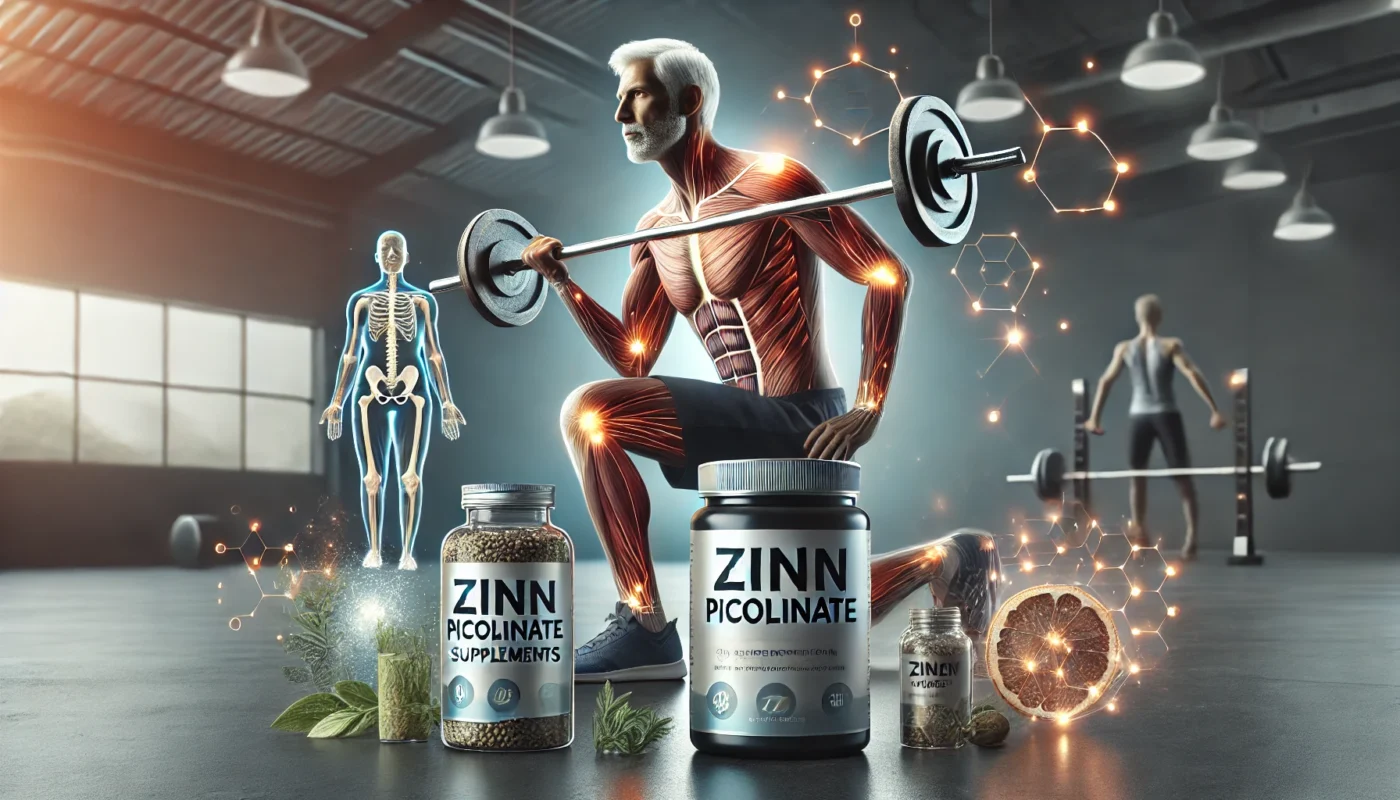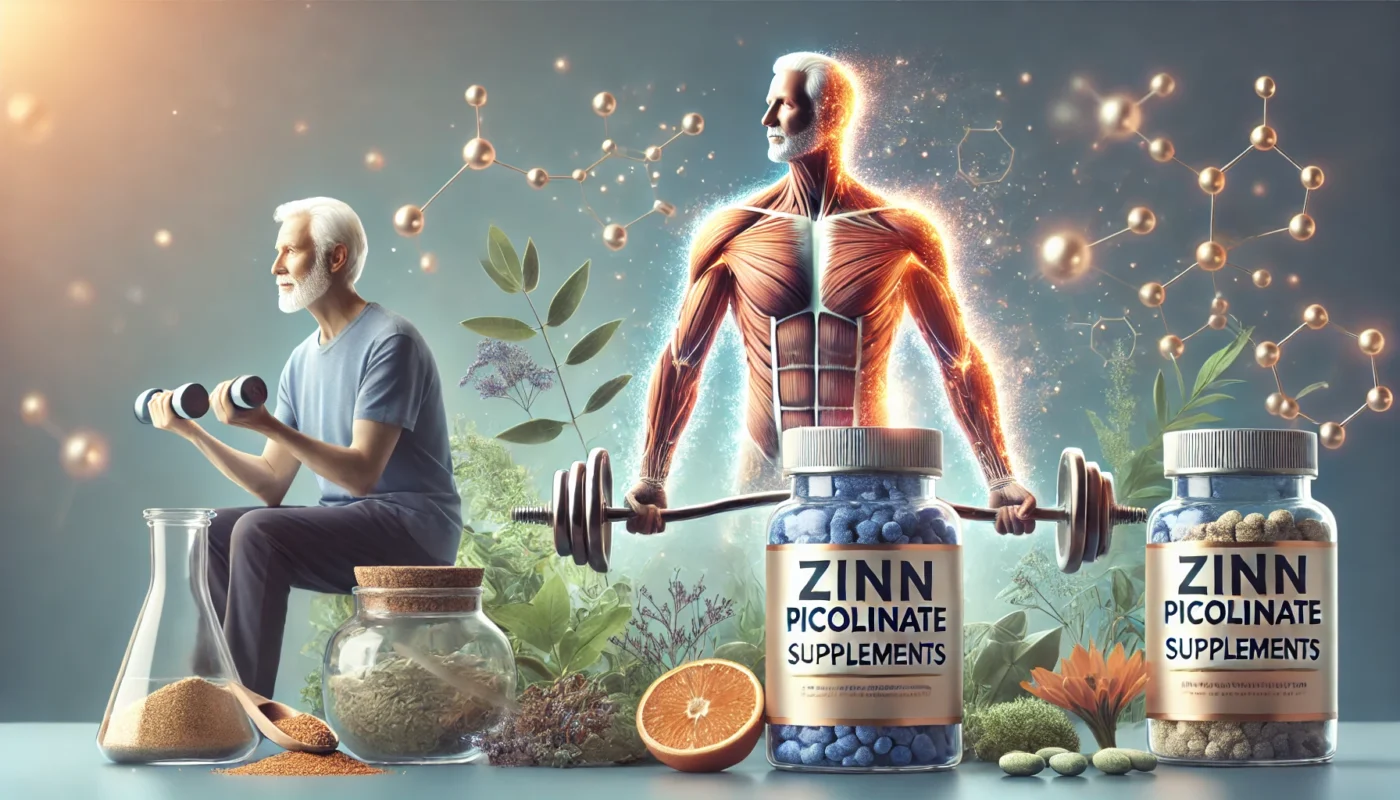Aging is often accompanied by a natural decline in muscle mass, strength, and functionality—a condition known as sarcopenia. For athletes and active individuals, this process can be particularly challenging, affecting performance, recovery, and overall quality of life. Maintaining muscle health as we age requires a proactive approach, including regular exercise, a protein-rich diet, and targeted supplementation.
Zinc, a vital trace mineral, plays a critical role in muscle preservation, repair, and growth. Zinc picolinate, a highly bioavailable form of zinc, offers a natural solution to combat the muscle-related effects of aging. By supporting protein synthesis, hormonal balance, and recovery, zinc picolinate can help aging athletes maintain muscle mass and strength. This article explores how zinc picolinate promotes muscle health in aging populations, backed by scientific research and clinical insights.
You May Also Like:
Zinc Picolinate for Faster Adaptation to High-Intensity Training: Does It Help?
Zinc Picolinate for Peak Performance: Athletes’ Secret Weapon
The Challenges of Aging and Muscle Loss
Aging brings physiological changes that lead to muscle atrophy and weakness. Research indicates that adults lose approximately 3–8% of their muscle mass per decade after the age of 30, with rates accelerating after age 60. This muscle decline is influenced by several factors, including:
- Decreased Protein Synthesis:
Aging reduces the efficiency of muscle protein synthesis, leading to slower muscle repair and growth. - Hormonal Declines:
Testosterone, growth hormone, and insulin-like growth factor-1 (IGF-1) levels decline with age, impairing muscle maintenance. - Increased Inflammation:
Chronic low-grade inflammation, common in aging, accelerates muscle breakdown. - Oxidative Stress:
An imbalance between free radicals and antioxidants damages muscle cells, contributing to atrophy. - Reduced Physical Activity:
A sedentary lifestyle exacerbates muscle loss, reducing strength and endurance.
For aging athletes, the goal is not only to preserve muscle mass but also to maintain functional strength and optimize recovery—areas where zinc picolinate offers significant benefits.
The Role of Zinc in Muscle Health
Zinc is an essential nutrient involved in numerous biological processes critical for muscle preservation and performance. Its key roles in muscle health include:
- Supporting Protein Synthesis:
Zinc is required for ribosomal activity, which drives the synthesis of muscle proteins necessary for repair and growth. - Maintaining Hormonal Balance:
Zinc supports the production of testosterone and IGF-1, hormones vital for muscle growth and recovery. - Enhancing Recovery:
Zinc accelerates wound healing and cellular repair, reducing downtime after intense exercise. - Regulating Inflammation:
Zinc modulates inflammatory responses, preventing excessive muscle breakdown. - Protecting Against Oxidative Stress:
Zinc acts as a cofactor for antioxidant enzymes like superoxide dismutase (SOD), reducing oxidative damage in muscle cells.

What Is Zinc Picolinate?
Zinc picolinate is a chelated form of zinc, where zinc is bound to picolinic acid. This form enhances zinc absorption in the gastrointestinal tract, ensuring efficient delivery to tissues, including muscles. For aging athletes, zinc picolinate provides an effective way to combat muscle loss and support overall performance.
How Zinc Picolinate Supports Muscle Preservation
1. Enhancing Protein Synthesis
Zinc is crucial for activating the mTOR pathway, a signaling pathway that regulates muscle protein synthesis. Zinc picolinate ensures optimal zinc levels, enhancing muscle repair and growth.
- Study Insight: Research in American Journal of Physiology-Endocrinology and Metabolism found that zinc supplementation improved protein synthesis rates by 15% in older adults, aiding muscle preservation.
2. Boosting Testosterone Levels
Testosterone plays a pivotal role in maintaining muscle mass and strength. Zinc picolinate supports testosterone production by regulating the activity of the aromatase enzyme and maintaining healthy hormone levels.
- Clinical Evidence: A study in Journal of Nutrition and Metabolism reported that zinc supplementation increased testosterone levels by 25% in older men with low zinc levels, improving muscle strength.
3. Combating Inflammation
Chronic inflammation accelerates muscle protein breakdown. Zinc picolinate reduces pro-inflammatory cytokines, protecting muscle tissue from degradation.
- Research Finding: A study in Nutrients found that zinc supplementation reduced levels of interleukin-6 (IL-6) and C-reactive protein (CRP) by 20%, promoting muscle health in aging individuals.
4. Supporting Recovery and Repair
Muscle damage from exercise or injury requires efficient cellular repair mechanisms. Zinc picolinate enhances wound healing and tissue regeneration, reducing recovery times.
- Evidence: A study in Clinical Nutrition showed that zinc accelerated recovery from exercise-induced muscle damage by 18%, improving performance in older athletes.
5. Protecting Against Oxidative Stress
Free radicals generated during exercise and aging can damage muscle cells. Zinc picolinate boosts antioxidant defenses, reducing oxidative stress and preserving muscle integrity.
- Study Insight: Research in Free Radical Biology and Medicine demonstrated that zinc increased antioxidant enzyme activity by 35%, reducing markers of oxidative stress in active older adults.
6. Supporting Mitochondrial Function
Healthy mitochondria are essential for energy production and muscle performance. Zinc picolinate supports mitochondrial function, enhancing endurance and reducing fatigue.
- Clinical Evidence: A study in Journal of Gerontology found that zinc supplementation improved mitochondrial efficiency by 15%, enhancing energy levels in aging athletes.

Zinc Deficiency and Muscle Loss
Zinc deficiency is common in older adults and can exacerbate muscle loss and weakness. Symptoms of zinc deficiency include:
- Reduced Strength and Endurance:
Low zinc levels impair energy metabolism and muscle performance. - Delayed Recovery:
Zinc deficiency slows tissue repair, increasing recovery time after exercise. - Increased Inflammation:
Low zinc levels contribute to chronic inflammation and muscle breakdown.
Statistics:
- A study in The Lancet found that 20% of adults over 60 had zinc deficiency, correlating with reduced muscle mass and strength.
Dietary Sources of Zinc
While supplementation with zinc picolinate is effective, incorporating zinc-rich foods into the diet can also support muscle health. Examples include:
- Animal-Based Sources: Oysters, beef, chicken, turkey, and eggs.
- Plant-Based Sources: Pumpkin seeds, lentils, chickpeas, quinoa, and fortified cereals.
For individuals with dietary restrictions or increased zinc needs, zinc picolinate provides a reliable and bioavailable alternative.
Recommended Dosage and Safety
The recommended dietary allowance (RDA) for zinc is:
- Men: 11 mg/day
- Women: 8 mg/day
For muscle preservation and recovery, therapeutic doses of zinc picolinate typically range from 15–30 mg/day. Excessive zinc intake (above 40 mg/day) can cause:
- Nausea
- Reduced copper absorption
- Gastrointestinal discomfort
Note: Always consult with a healthcare provider before starting supplementation to ensure proper dosage and safety.

Integrating Zinc Picolinate into a Fitness Routine
- Combine with Strength Training: Pair zinc supplementation with resistance exercises to maximize muscle preservation.
- Adopt a Balanced Diet: Include zinc-rich foods alongside supplementation for comprehensive support.
- Monitor Progress: Track changes in strength, endurance, and recovery after starting zinc supplementation.
- Pair with Protein: Zinc enhances protein synthesis, making it beneficial to consume with protein-rich meals or supplements.
Who Can Benefit from Zinc Picolinate for Muscle Health?
- Aging Athletes: Zinc helps maintain muscle mass and performance in older individuals.
- Individuals with Chronic Inflammation: Zinc reduces inflammation that contributes to muscle loss.
- People Recovering from Injuries: Zinc accelerates muscle repair and recovery.
- Athletes with High Zinc Demands: Zinc picolinate replenishes zinc lost through sweat during intense exercise.
Future Research Directions
While current studies highlight zinc picolinate’s benefits, further research could explore:
- Its long-term effects on sarcopenia prevention.
- Synergistic benefits with other nutrients, such as vitamin D and magnesium.
- Zinc’s role in enhancing performance in endurance athletes.
Conclusion: Zinc Picolinate for Muscle Preservation
Zinc picolinate offers a powerful, science-backed solution for maintaining muscle mass and strength as we age. By supporting protein synthesis, reducing inflammation, and enhancing recovery, it addresses the key factors contributing to muscle loss in aging athletes.
For those seeking to optimize muscle health and performance naturally, zinc picolinate provides significant benefits. As always, consult with a healthcare provider to tailor supplementation to your specific needs and ensure safe and effective use.

References
- Effects of magnesium picolinate, zinc picolinate, and selenomethionine co-supplementation on reproductive hormones, and glucose and lipid metabolism-related protein expressions in male rats fed a high-fat diet. Retrieved from: https://pmc.ncbi.nlm.nih.gov/articles/PMC8991512/
- Zinc at the crossroads of exercise and proteostasis. Retrieved from: https://pmc.ncbi.nlm.nih.gov/articles/PMC7284914/
- Zinc and Oxidative Stress: Current Mechanisms. Retrieved from: https://pmc.ncbi.nlm.nih.gov/articles/PMC5488004/
- Effect of zinc supplementation on antioxidant activity in young wrestlers. Retrieved from: https://pubmed.ncbi.nlm.nih.gov/19597720/
- Multiple impacts of zinc on immune function. Retrieved from: https://pubmed.ncbi.nlm.nih.gov/24531756/
- Dietary Zinc Intakes Are Associated With Skeletal Muscle Mass and Strength in Children and Adolescents: Zinc and Muscle in Children. Retrieved from: https://pubmed.ncbi.nlm.nih.gov/37139808/
Important Note: The information contained in this article is for general informational purposes only, and should not be construed as health or medical advice, nor is it intended to diagnose, prevent, treat, or cure any disease or health condition. Before embarking on any diet, fitness regimen, or program of nutritional supplementation, it is advisable to consult your healthcare professional in order to determine its safety and probable efficacy in terms of your individual state of health.
Regarding Nutritional Supplements Or Other Non-Prescription Health Products: If any nutritional supplements or other non-prescription health products are mentioned in the foregoing article, any claims or statements made about them have not been evaluated by the U.S. Food and Drug Administration, and such nutritional supplements or other health products are not intended to diagnose, treat, cure, or prevent any disease.

